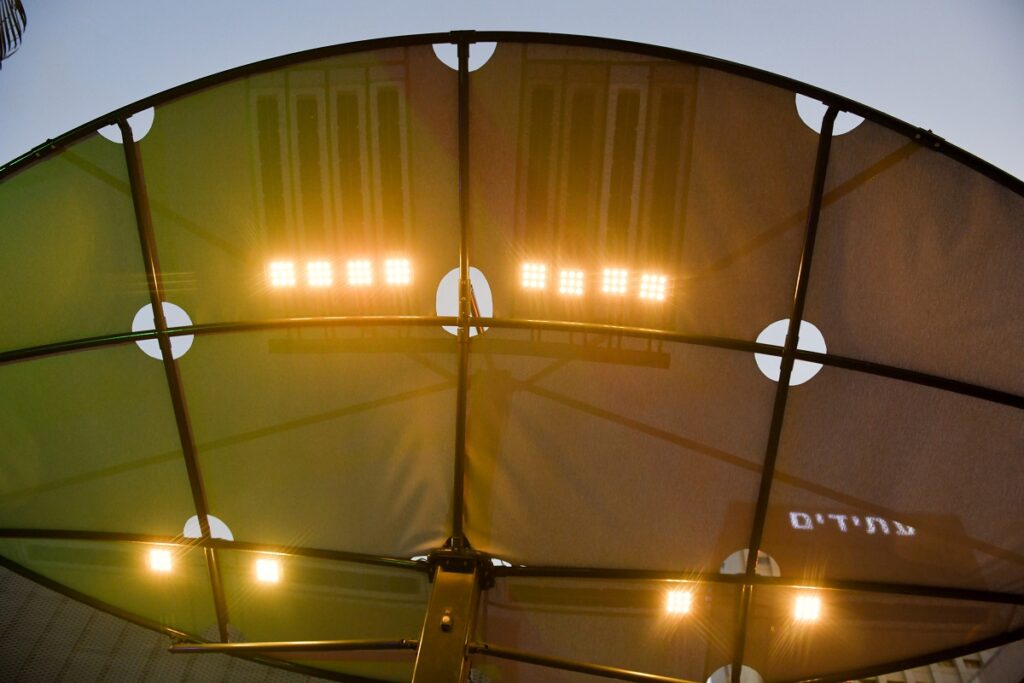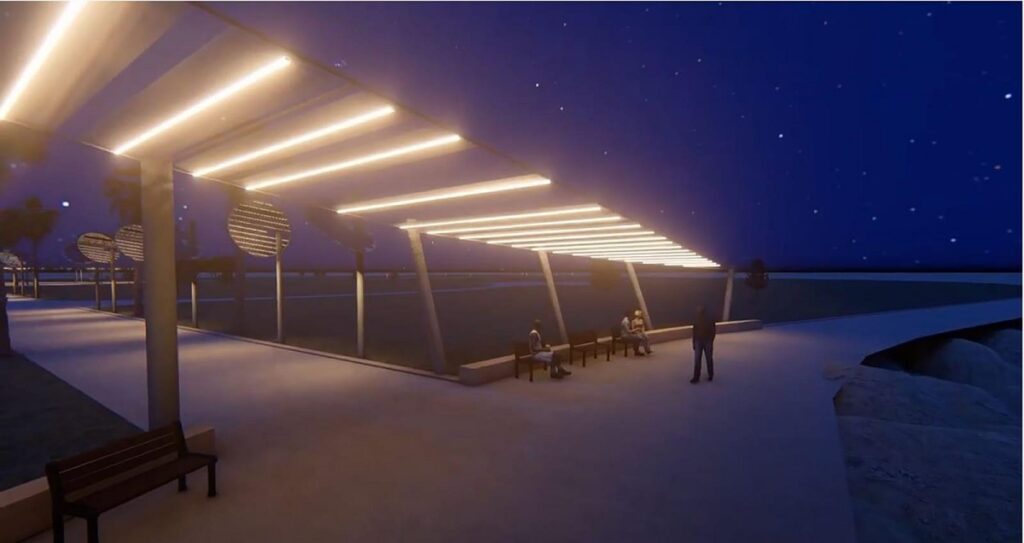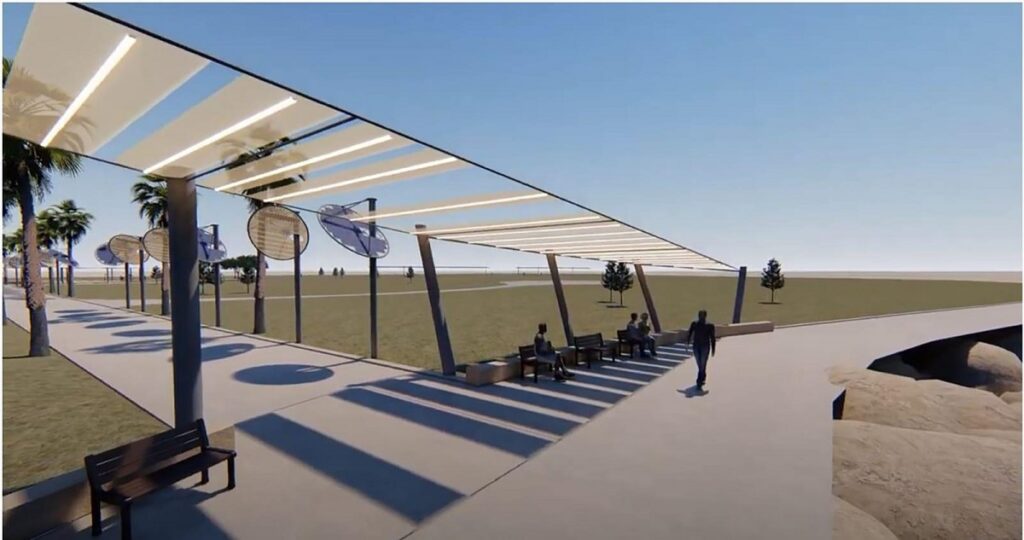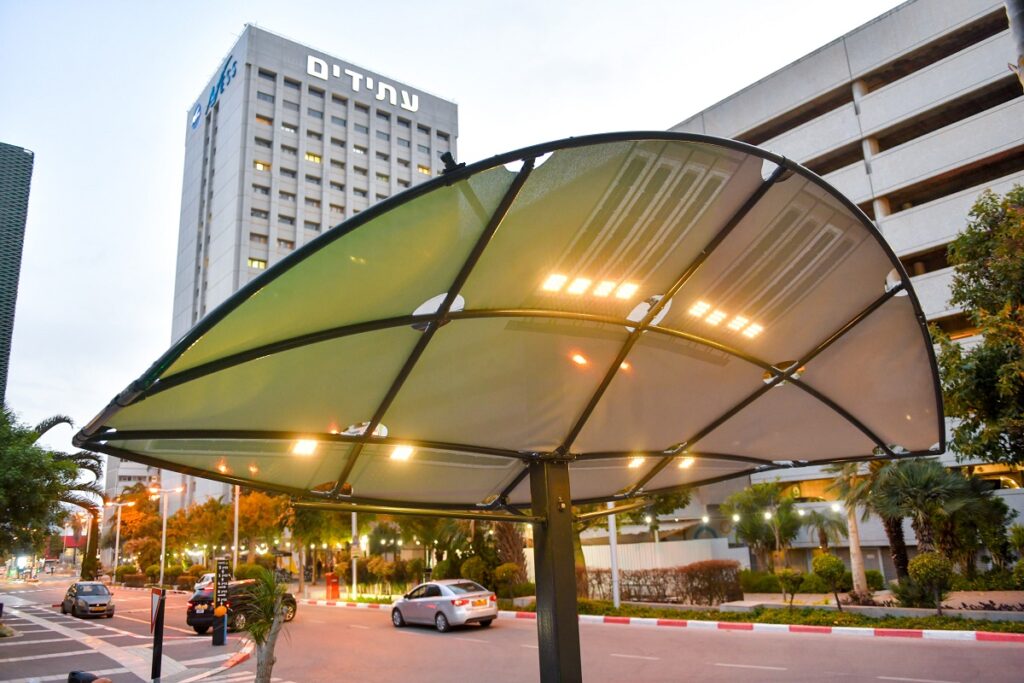Shade by day, light by night? The city of Tel Aviv-Jaffa has implemented a “cool” new street fabric that provides both — without the need for electricity.
The municipality is currently piloting a new, eco-friendly system in northern Tel Aviv, which uses solar energy to supply shade during daytime hours and illumination when the sun goes down.
Through its features, the Lumiweave system saves “at least 50 percent of the cost of installing the infrastructure of standard lighting and 100 percent of electricity costs,” a statement from the company said. Lumiweave also enables the customer to control the timing and intensity of lighting.
Lumiweave is an outdoor fabric material embedded with solar and organic photovoltaic (PV) cells that store solar energy during daytime hours for off-grid lighting in the evening. It provides shading while it harnesses the sun’s energy, the system’s designer Anai Green tells NoCamels. More specifically, the sheet is made of polymer strips with LEDs that emit light after receiving energy from the PV system attached to it during the day.

Green’s solution combines a “workable approach” to climate change and the growing challenge of shading in urban areas, with a solution that operates on a basis of renewable and clean energy, that enables lighting without using polluting fuels.
“Thinking about sustainability, green energy, and climate protection is part of the DNA of the Tel Aviv-Yafo Municipality. From the planning stages to the execution stages, we think green, plan green, imagine green,” said Ron Huldai, mayor of Tel Aviv-Yafo, in the company’s statement. “I believe that Lumiweave will turn out to be a groundbreaking venture.”
The system was designed to withstand all weather conditions and can even continue to provide lighting even after three days without sun.
The sheet has been installed for an experimental period in the city’s Atidim Park, an industrial area of the Ramat HaChayal neighborhood.
The lightweight and flexible system was developed by Israeli industrial and product designer Anai Green, who was selected as one of four innovators to win the 2nd International C40 Women4Climate Tech Challenge in 2020. The challenge, at the time in its second year, was organized by Women4Climate, a group of mayors, entrepreneurs, innovators, students, scientists, and activists that aims to enhance women’s participation and leadership in building a sustainable future.
The city of Tel Aviv joined C40 Cities 2017 among 96 cities that represent one-twelfth of the world’s population and a quarter of the global economy.
It doesn’t require any additional or existing infrastructure, which makes it particularly innovative, Green explains.
“There are no carbon emissions at all,” she says, “We use it to light public space without spreading light pollution — because the light is under a canopy.” Light pollution refers the effects of unwanted, excessive, or poorly implemented artificial lighting.
“We spread light in the area we want to light only,” Green adds.
Sign up for our free weekly newsletter
Subscribe
The pilot project, organized as part of a collaboration with CityZone Innovation Laboratory, an innovation lab developed in a partnership between Atidim Park, Tel Aviv University, and the Tel Aviv municipality, has been overseen by Green and Lumiweave cofounder Tal Parnes, a serial high-tech entrepreneur.
“Since Atidim Park has set the goal of advancing technologies in the smart city field, through a unique experimental laboratory – Cityzone – Tel Aviv’s Environment and Sustainability Authority approached Atidim to install the shading sheet in the park area and the Park gladly complied,” Sagi Niv, CEO of Atidim Park Tel Aviv, tells NoCamels. “In collaboration with the park management and the entrepreneurs, an ideal location was chosen that took into account the needs of people passing through, and considered the angles of the sun in different seasons on one hand, and the significant exposure to the [businessman working in the area] on the main boulevard of the park.”
What’s next for Lumiweave?
Anai Green is an industrial and product designer that grew up in Israel and attended the Bezalel Academy of Art and Design in Jerusalem. She worked in Japan before opening her own design studio in Israel. Anai’s interests have included lighting, furniture, the design of spatial objects, and the relationship between materials, form, and technologies “to bring her designs to impact everyday life in urban settings,” according to her profile on the Women4Climate website. Prior to her work on Lumiweave, Green was a collaborator in Megama, a strategic design office, for the Landscape Urbanism Biennale” called “32N Urban Shade.” The project focused on the significance of natural and built shade in the coastal city of Bat Yam, Israel.
Lumiweave “combines Anai’s unique interests in emerging LED lighting technologies, flexible PV cells, with the potential of textiles in outdoor uses to address the problem of rising temperatures in urban environments,” the profile reads.
There are lots of ways to implement Lumiweave, Green tells NoCamels, saying that its “really good for parks, bicycle paths, and walking areas.” It can also be used as umbrellas and canopies of varying sizes.
Green says Lumiweave already has new projects in Tel Aviv, including changing the canopies of the Sarona neighborhood. She is also in discussions with relevant parties to install Lumiweave’s smart shade in parks in the cities of Ra’anana, Kfar Saba, and Ganei Tikva. The Ariel Sharon Park, located southeast of Tel Aviv, is also on that list. Green tells NoCamels the company is in talks with NTA Metroolitan Mass Transit System, the company developing the Tel Aviv Light Rail to install Lumiweave at various stations.

“We have started to develop parasols for restaurants and hotels,” Green says, “They will have shade and then at night, it will light up automatically. The workers will have full control over it. We are now developing the possibility of controlling it from the phone — we’re creating an application.”
Lumiweave is also developing light motion materials. They are creating a shade and light that will turn on automatically when it senses a person approaching and will turn off when there is no presence of people. “It will be flexible in the way that we can manipulate it,” she says.
“The LumiWeave venture Is an initiative that combines many vital aspects of sustainability, including shading, green energy, pollution reduction, cost reduction while making a green contribution to the environment, and in any case improving the quality of life of all of us in the public space,” Niv said in a statement.
“We are very pleased to work with the Tel Aviv-Yafo Municipality on fulfilling our vision of improving the experience of staying in the public space, while preserving the environment, by sustainable systems that can be installed easily and cheaply, anywhere and anytime,” Green said.
Additional reporting by Max Kaplan-Zantopp
Related posts

Resilient And Nutritious New Plant-Based Milk Aims To Make A Splash

Chocolate From Cultivated Cocoa Comes Without Environmental Toll

Plastic Fantastic: Startup Takes PVC Back To Its Crude Oil Roots




Facebook comments